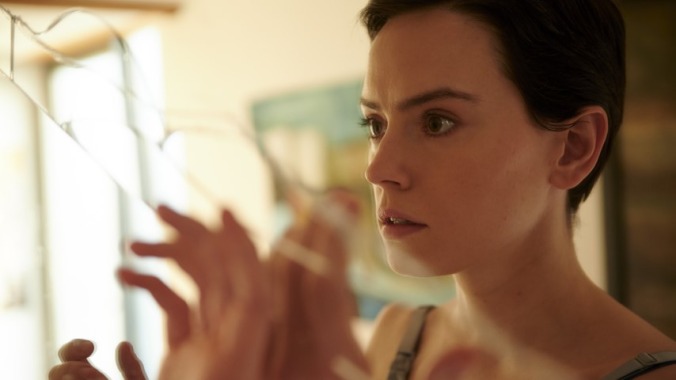Daisy Ridley’s Magpie Is a Dull Psychological Thriller Yearning for a Sharper Edge
Photos via Shout! Studios
For a revenge-minded thriller, arguably the worst thing a film can be would be “bashful.” That goes doubly for a film like Sam Yates’ Magpie, so clearly inspired by the height of the erotic thriller era, aiming to ape the mannerisms of a Fatal Attraction while simultaneously shying away from fully committing to that sort of zealous, sordid payoff. Credited to being “based on an original idea” from star Daisy Ridley, Magpie works in fits and starts as a portrait of an unbelievably, almost comically toxic marriage, but never aspires to really plumb the psyches of its characters or present them with anything but the most obvious and unchallenged choices. It sets its one-dimensional people on cruise control for the vast majority of its runtime, leading the story ploddingly toward what turns out to be a genuinely audacious twist, but one that arrives too late to fully appreciate in anything but retrospect. Sacrificing 85 conventional minutes to fuel 5 engaging minutes simply isn’t a workable ratio, not in a genre of “erotic thriller, without the eroticism.”
Despite that, Ridley’s presence is pretty strong in Magpie as Annette, a mother of two young children (one a precocious little would-be actress, the other an infant) who suffers from both debilitatingly vague mental illness and the emotional abandonment of a supposed writer husband who has all but entirely checked out of their lives. At home in the confoundingly large and luxurious country mansion where husband Ben (Shazad Latif) relocated them a year or more ago while forcing Annette to give up her career, Ridley’s character is a bundle of fraying nerves who fights the good fight not to resent her ever-wailing infant son while receiving less than zero assistance from the supremely self-centered Ben. It’s an opening state of affairs that evokes the similarly cloistered loathing of Amy Adams’ upcoming Nightbitch, except without the magical realism–no one here is transforming into a dog, or anything else. Instead, Ridley is tasked with another adult examination of decaying mental state in her post-Star Wars, serious actress breakout of 2024, which has also included the likes of Sometimes I Think About Dying and Young Woman and the Sea. The problem here is mostly that although Ridley is game to thickly layer on the crazy, writer Tom Bateman’s screenplay never bothers to provide adequate evocation for the roots of her myriad psychoses, and they mostly end up feeling unearned.
Because rest assured, Annette is definitely nuts from the start, but we don’t for a moment understand how or why, exactly, other than that it likely grew out of a period of abandonment when Ben previously left the family for months of a “research trip” that certainly sounds a lot more like a couple undergoing a separation, one that presumably ended in the name of being united for the young kids. Ben vaguely mentions to others that Annette has “troubles,” and “medication,” though we see no evidence of it, or of literally any kind of mental health treatment in her life. She’s simply crouched at the neurotic starting line when we meet her, waiting for the gun to fire for a practically instantaneous sprint into madness. Literally one day after Ben begins bringing young daughter/aspiring child actress Tilly (Hiba Ahmed) to work on a movie set alongside glamorous film star Alicia (Matilda Lutz), with whom he is immediately smitten, Annette is already shattering mirrors with her hands and burning herself with hot water, so lost is she in her rapidly bubbling delusions. It’s just not what one would call a commensurate emotional or mental response to what is so far a relatively minor bit of marital friction. One wonders, constantly: How the hell did this marriage manage to hold itself together for even a week previously, if these two are both so stricken by emotional fragility and loathing? How can we buy that the pair ever had any fondness for one another?
Bateman’s screenplay has no answers, and fails to assemble anything that feels like a genuine interaction or lived-in relationship between Annette and Ben. She’s simply forced to be the full-time caregiver, the authority figure who won’t allow Tilly to have pancakes any time she pleases, while Ben gets to be the fun, permissive parent–one who sees what he believes to be a kindred spirit in Alicia, the beautiful film star whose life has recently hit a rough patch thanks to the leak of a (incredibly bland and unremarkable) sex tape. She’s everything that Annette is not, of course–perpetually warm, kind and accessible, and never hesitating to be immediately flirtatious with a random, married father of two. Why would this supposedly world famous starlet be so interested in breaking up a marriage with two kids in the mix, with a man she just met? It’s unclear, other than the vague idea that she’s searching for some new kind of fulfillment and seems to believe out of the blue that stepping into the surrogate mother role will somehow provide it. All that matters to Ben is that she’s hot, and not Annette, and that she has a standing “pancakes at any time” policy. As in so much in Magpie, the development of their affair feels unearned, without any ethical weighing, tip-toeing or consideration behind it–everyone just lets things happen without a moment of doubt or blowback.
-

-

-

-

-

-

-

-

-

-

-

-

-

-

-

-

-

-

-

-

-

-

-

-

-

-

-

-

-

-

-

-

-

-

-

-

-

-

-

-








































